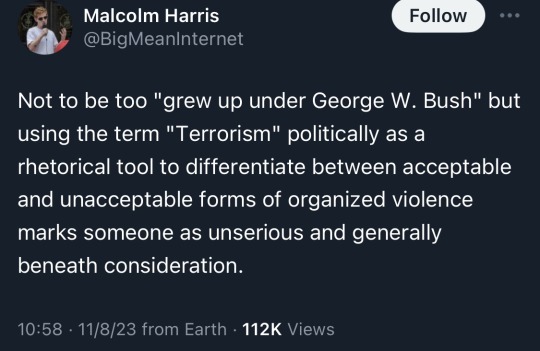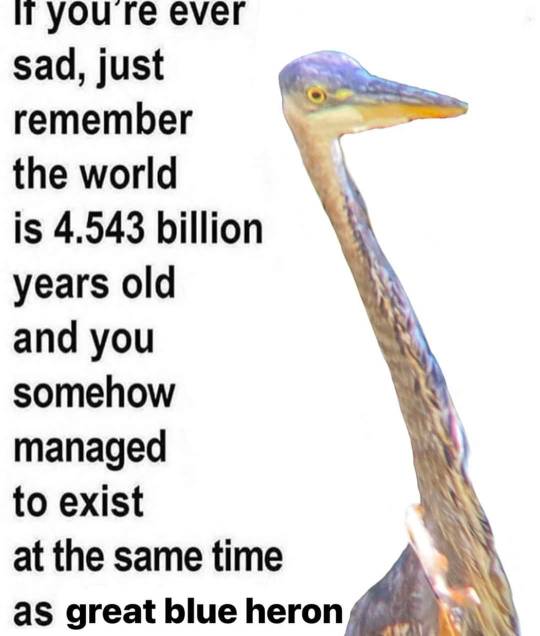Text
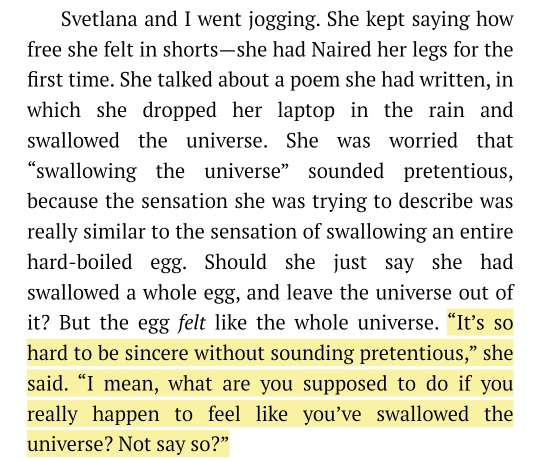
the idiot, elif batuman
#put a hold at the library for either/or and remembering selin and svetlana my best friends selin and svetlana........#elif i love you so much!!!!!!!!#elif batuman#lit
361 notes
·
View notes
Text
may all of you get to experience being loved properly
13K notes
·
View notes
Text
being madly in love with someone platonically is so ridiculous. hey man i think about you all the time. i wish you were here right now. talking to you makes me indescribably happy. i miss you. honestly what the hell
#GOD THIS WAS SO REAL.#oh november 2023 me. you're gonna have like 18 people you feel this way about VERY soon !!!!!!!!!!!#(and you will still desperately want to **** one of them. sorry)
55K notes
·
View notes
Text
In every arena, we need to look at industrial-scale and systemic violence, not just the hands-on violence of the less powerful. When it comes to climate change, this is particularly true. Exxon has decided to bet that we can't make the corporation keep its reserves in the ground, and the company is reassuring its investors that it will continue to profit off the rapid, violent and intentional destruction of the Earth.
That's a tired phrase, the destruction of the Earth, but [...] climate change is global-scale violence, against places and species as well as against human beings. Once we call it by name, we can start having a real conversation about our priorities and values. Because the revolt against brutality begins with a revolt against the language that hides that brutality.
belated happy 10th birthday to "call climate change what it is: violence," by rebecca solnit, originally published on april 7th, 2014. [part 1] [part 2]
5 notes
·
View notes
Text
Rather than worrying about whether ordinary human beings will react turbulently to the destruction of the very means of their survival, let's worry about that destruction – and their survival. Of course water failure, crop failure, flooding and more will lead to mass migration and climate refugees – they already have – and this will lead to conflict. Those conflicts are being set in motion now.
[...] People revolt when their lives are unbearable. Sometimes material reality creates that unbearableness: droughts, plagues, storms, floods. But food and medical care, health and well-being, access to housing and education – these things are also governed by economic means and government policy.[...]
Climate change will increase hunger as food prices rise and food production falters, but we already have widespread hunger on Earth, and much of it is due not to the failures of nature and farmers, but to systems of distribution. Almost 16m children in the United States now live with hunger, according to the US Department of Agriculture, and that is not because the vast, agriculturally rich United States cannot produce enough to feed all of us. We are a country whose distribution system is itself a kind of violence.
belated happy 10th birthday to "call climate change what it is: violence," by rebecca solnit, originally published on april 7th, 2014. [part 1] [part 3]
#rebecca solnit#climate change#cc#couldn't find all of my favourite parts on this website so now putting all of them together in one place for me
3 notes
·
View notes
Text
Call Climate Change What It Is: Violence
If you're poor, the only way you're likely to injure someone is the old traditional way: artisanal violence, we could call it – by hands, by knife, by club, or maybe modern hands-on violence, by gun or by car.
But if you're tremendously wealthy, you can practice industrial-scale violence without any manual labor on your own part. You can, say, build a sweatshop factory that will collapse in Bangladesh and kill more people than any hands-on mass murderer ever did, or you can calculate risk and benefit about putting poisons or unsafe machines into the world, as manufacturers do every day. If you're the leader of a country, you can declare war and kill by the hundreds of thousands or millions. And the nuclear superpowers – the US and Russia – still hold the option of destroying quite a lot of life on Earth.
So do the carbon barons. But when we talk about violence, we almost always talk about violence from below, not above.
one of my favourite, life-changing articles just turned 10 years old!! happy birthday to this piece by rebecca solnit, originally published on april 7th, 2014. [part 2] [part 3]
#rebecca solnit#climate change#re-reading it for Reasons and like. it wasn't perfect but it sure fucking was GOOD. genuinely life-changing back then!!!!!#cc
5 notes
·
View notes
Text
girl dad not as in a dad with daughters but as in a girl who shares the tastes habits and personality traits of a middle aged father
8K notes
·
View notes
Photo
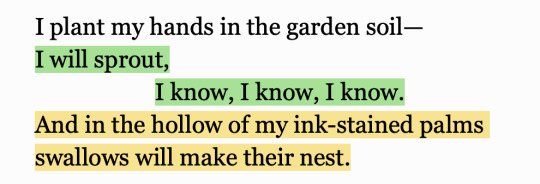
Forugh Farrokhzad, tr. by Sholeh Wolpé, from “Reborn”, Sin
2K notes
·
View notes
Text
Three of Cups
by Marty McConnell
At some point it becomes true that all stories
are love stories. all making, love making.
I didn’t make this rule. but it binds me
all the same. I wish there were a law
against condescending against love. against
the economy of fear that says your joy
means less joy for me as if love
were pie, or money, or fossil fuel
dug or pumped from the earth, gone
when it’s gone. it’s just not true. the heart
with its gift for magnificent expansion
is not coal. not fruit set to spoil or the dollar
cringing in its wallet. when you say darling,
the world lights up at its edges. when mouths
find mouths and minds follow or minds find
minds and mouths, hands, hips, toes, follow –
how about you call that sacred. how about you raise
your veined right hand and swear on the blood
that branches there, yes. I take this crush
to be my lawful infatuation. I will bend toward joy
until the bending’s its own pleasure. I will memorize
photographs and street maps, I will acquiesce
to the maudlin urgency of pop songs and dance,
and dance – there’s a perfection only the impossible kiss
possesses. there are notes you can only hear naked
in the dark of a room to which you will never
return. anything that moves the world toward light
is a blessing. why not take it with both hands,
lift it to your lips like a broth of stars. this
is the substance that holds our little atoms together
into bodies. this sweet paste of longing
is all that binds us to the earth.
and all we know of the gods.
#oh my god!!!!!!!!!#mim if you see this......#'i wish there was a law against condescending against love' is very you#poetry#marty mcconnell#variations in a theme.#come over#the most 'come over' oh my god...... poems that are conversations you have literally had before
54 notes
·
View notes
Text
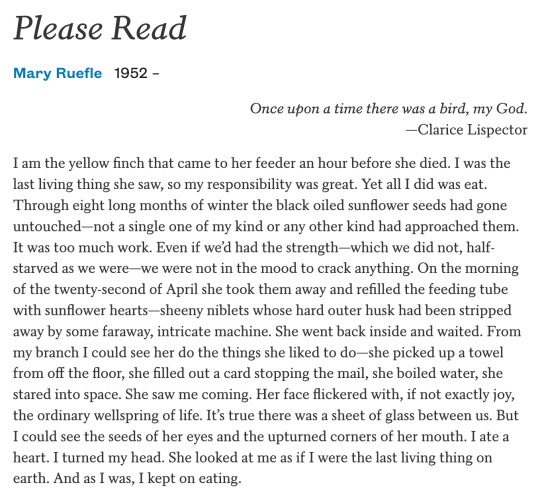
please read by Mary Ruefle
2K notes
·
View notes
Text
The [...] British quest for Tahitian breadfruit and the subsequent mutiny on the Bounty have produced a remarkable narrative legacy [...]. William Bligh’s first attempt to transport the Tahitian breadfruit [from the South Pacific] to the Caribbean slave colonies in 1789 resulted in a well-known mutiny orchestrated by his first mate [...]. [T]he British government [...] successfully transplanted the tree to their slave colonies four years later. [...] [There was a] colonial mania for [...] the breadfruit, [...] [marked by] the British determination to transplant over three thousand of these Tahitian food trees to the Caribbean plantations to "feed the slaves." [...]
Tracing the routes of the breadfruit from the Pacific to the Caribbean, [...] [shows] an effort initiated, coordinated, and financially compensated by Caribbean slave owners [...]. [During] decades worth of lobbying from the West Indian planters for this specific starchy fruit [...] planters [wanted] to avert a growing critique of slavery through a "benevolent" and "humanitarian" use of colonial science [...]. The era of the breadfruit’s transplantation was marked by a number of revolutions in agriculture (the sugar revolution), ideology (the humanitarian revolution), and anticolonialism (the [...] Haitian revolutions) [as well as the American and French revolutions]. [...] By the end of Joseph Banks’ tenure [as a botanist and de facto leader] at the Kew Botanical Gardens [royal gardens in London] (1821), he had personally supervised the introduction of over 7,000 new food and economic plants. [...] Banks produced an idyllic image of the breadfruit [...] [when he had personally visited Tahiti while part of Captain Cook's earlier voyage] in 1769 [...].
---
[I]n the wake of multiple revolutions [...], [breadfruit] was also seen as a panacea for a Caribbean plantation context in which slave, maroon, and indigenous insurrections and revolts in St Vincent and Jamaica were creating considerable anxiety for British planters. [...]
Interestingly, the two islands that were characterized by ongoing revolt were repeatedly solicited as the primary sites of the royal botanical gardens [...]. In 1772, when St Vincentian planters first started lobbying Joseph Banks for the breadfruit, the British militia was engaged in lengthy battle with the island’s Caribs. [...] By 1776, months after one of the largest slave revolts recorded in Jamaica, the Royal Society [administered by Joseph Banks, its president] offered a bounty of 50 pounds sterling to anyone who would transfer the breadfruit to the West Indies. [...] [A]nd planters wrote fearfully that if they were not able to supply food, the slaves would “cut their throats.” It’s widely documented that of all the plantation Americas, Jamaica experienced the most extensive slave revolts [...]. An extensive militia had to be imported and the ports were closed. [...]
By seeking to maintain the plantation hierarchy by importing one tree for the diet of slaves, Caribbean planters sought to delay the swelling tide of revolution that would transform Saint Domingue [Haiti] in the next few years. Like the Royal Society of Science and Arts of Cap François on the eve the Haitian revolution, colonists mistakenly felt they could solve the “political equation of the revolution […] with rational, scientific inquiry.” [...]
---
When the trees arrived in Jamaica in 1793, the local paper reported almost gleefully that “in less than 20 years, the chief article of sustenance for our negroes will be entirely changed.” […] One the one hand, the transplantation of breadfruit represented the planters’ attempt to adopt a “humanitarian” defense against the growing tide of abolitionist and slave revolt. In an age of revolution, [they wanted to appear] to provide bread (and “bread kind”) [...]. This was a point not to be missed by the coordinator of the transplantation, Sir Joseph Banks. In a letter written while the Bounty was being fitted for its initial journey, he summarized how the empire would benefit from new circuits of botanical exchange:
Ceres was deified for introducing wheat among a barbarous people. Surely, then, the natives of the two Great Continents, who, in the prosecution of this excellent work, will mutually receive from each other numerous products of the earth as valuable as wheat, will look up with veneration the monarch […] & the minister who carried into execution, a plan [of such] benefits.
Like giving bread to the poor, Banks articulated this intertropical trade in terms of “exalted benevolence,” an opportunity to facilitate exchange between the peoples of the global south that placed them in subservience to a deified colonial center of global power. […]
---
Bligh had no direct participation in the [slave] trade, but his uncle, Duncan Campbell (who helped commission the breadfruit journey), was a Jamaican plantation owner and had employed Bligh on multiple merchant ships in the Caribbean. Campbell was also deeply involved, with Joseph Banks, in transporting British convicts to the colonies of Australia. In fact Banks’ original plan for the breadfruit voyage was to drop off convicts in (the significantly named) Botany Bay, and then proceed to Tahiti for the breadfruit. Campbell owned a series of politically untenable prison hulks on the Thames which he emptied by shipping his human chattel to the Pacific. Banks helped coordinate these early settlements [...] to encourage white Australian domesticization.
The commodification and rationalist dispersal of plants and human
convicts, slaves, the impoverished, women, and other unwilling participants in global transplantation is a rarely told narrative root of colonial “Bounty.”
---
All text above: Elizabeth DeLoughrey. “Globalizing the Routes of Breadfruit and Other Bounties”. Journal of Colonialism and Colonial History Volume 8, Number 3, Winter 2007. [Bold emphasis and some paragraph breaks/contractions added by me. Presented here for commentary, teaching, criticism purposes.]
39 notes
·
View notes
Text
world is a fuck etc etc HOWEVER the volume of dopamine bestowed by spending a few hours getting your hands dirty with either soil or flour...... something intensely old and familiar happening on a cellular level there
#drunk off the possibilities of this batch of plants..... fucking love dirt man. gardening RULES#AND doing so after getting covered in flour because was making zucchini bread (and also because i am debilitatingly stupid)#ideal. IDEAL.#i miss having a balcony but having an actual real kitchen AND a big kitchen window .is so!!!!!#god. could snort a basil leaf im so zooted off the gardening/baking double hit
3 notes
·
View notes

